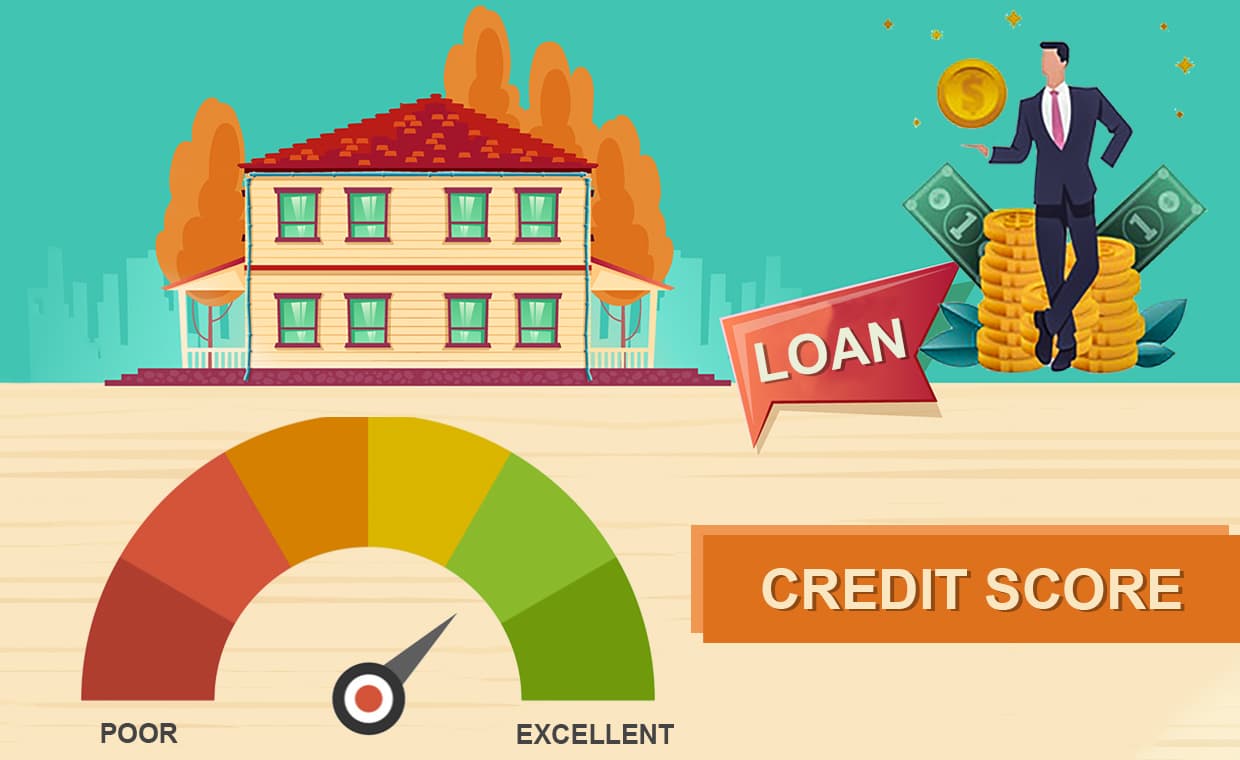
We often get to hear the coinage credit score, especially at the time of calculating financial eligibility of an earning individual. It is the statistical illustration of the credit credibility of a borrower. But how it is related to loan and how the calculation of the credit score is decided are quite extensive a discussion. Let’s start the topic with the pivotal question, “what is a credit score”?

In order to gap the financial constraints, people generally take loans to fulfill their needs and desires. Loans can be taken for various reasons such as for buying a home, car, or educational loans, and even short-term personal loans for excellent credit are available on demand. All financial institutions, NBFCs and banks provide loans to the applicant according to the eligibility of the borrower, and eligibility of the borrower is decided on the credit score. The chances of getting loans easily sanctioned at lower interest rates increases if the credit score of an individual is good. So, let’s understand how a credit Score is calculated and its importance in financial sector.
What is a Credit?
The Oxford Dictionary has defined Credit in a to-the-point approach. According to the book, “Credit has been defined as the credibility of a customer to obtain goods or services before clearing the payment, and this facility is offered on the basis of trust that the customer will clear the payment in the near future.
It is also defined as the legally approved financial method of lending as well as borrowed money under a credit arrangement.
In old times the bankers, as well as bank managers, were used to be local. The bankers or the bank managers mostly knew personally the 3 “C” of the borrowers/customers, i.e.,
- Credit
- Character
- Capacity to pay
There always used to be a long-time relation between the bank and the businessman, the potential borrowers. Personal clues were enough for any banker to judge whether to advance to certain borrowers or not in case of sanctioning a loan!
With urbanization, globalization and expansion of the banking system, a number of banks started operation with multiple branches, but neither the bankers nor the bank managers used to stay in a long time at one place to develop personal relation with the borrowers. Similarly, the managers regardless they are from the Government banks or from the private banks were supposed to get transferred from one town to other and could have hardly got time to develop any local contacts and gather adequate business information under such circumstances. The banker, therefore, could have hardly any data or information at its disposal for accurate decision making related to sanction and disbursement of advances and loans. However, if there were problems, there were solutions too.However, time was developing and same was relevant about data management about the worth of the borrowers: tracking the details of the borrowers have made many things possible, which one could hardly imagine even a decade ago. Several tools were developed to assess a borrower and the credibility in terms of market viability. The credit score is such a tool, which was developed to help bankers in decision making while making advance or loan to a potential borrower.
The reason why the banks and other financial institutions check or demand a credit score of an applicant is that it gives a clear idea to the lenders regarding the credit history, health, the ability and willingness of the borrower to pay back the borrowed amount.
What is a Credit Score?
A credit score is a numerical figure showing your credit worthiness. Credit score plays an important role in the financial system as it helps the borrower to secure the credit quickly.
Lenders use credit scores to determine the eligibility of getting a loan, the best suitable interest rate, and the highest credit limits.
A credit score is a three-digit number which ranges (credit score ranges) from 300 to 900 and applicant with higher credit score reserves higher chances of getting their loans approved easily and quickly if other issues are found satisfactory.
Please remember that “Credit Score” is neither your rating nor a marking based on personnel opinion of someone. It is more scientific based on data and data analyzing tools.
Factors Affecting Credit Score
01. Borrower’s Payment History
Making late payments or defaulting your EMIs / Instalments (recently or consistently) will negatively impact your score.
02. Outstanding and Opening Loan Amounts
An increase in the current balance of your credit card indicates or more numbers of cards with the outstanding as well as with an obligation of an increased repayment burden may negatively impact your credit score.
03. Numbers of Loan Accounts
This will largely affect the terms and conditions under which you can borrow money for loan purposes. Having a balanced mix between secured loans such as Auto, Home loan and unsecured loans such as Personal loan, Credit Card is likely to have a more positive effect on your score.
04. Multiple Enquiries
If you have recently been sanctioned multiple loans and credit cards, then lenders will view your application with caution because this behavior may indicate an increased debt burden in your account, which will negatively impact your score.
Who Determines your Credit Score?
In all countries, there are now multiple credit rating agencies which perform the task. In India, a Credit Bureau is licensed by the RBI and governed by the Credit Information Companies (Regulation) Act of 2005. The credit score is calculated by major credit rating agencies – Experian, Equifax and Trans Union.
In India, the credit score is calculated by the Central Information Bureau of India Limited (CIBIL) which started this rating system in the year 2000.
They collect and maintain records of individual and commercial entitles repayments and payment history pertaining to loans, credit cards etc. These records are submitted to them by banks/NBFCs and other lenders on a monthly basis. Using this information, a credit report is developed based on an evolved system.
The person having a higher credit score generally attract favorable terms and lower interest rates for mortgage purposes whereas, the individual having lower credit score may face a higher interest rate.
Benefits of a Good Credit Score

An individual having a good credit score gains many benefits over those who have lower score or no credit score at all. Listed below some of the benefits, which come in favor of the individual having a good credit score:
01. Quick Loan Approval
A good credit score depicts that you are a good and relibale client to lend money so the banks will try to provide you the loan as early as possible. The person having low credit score will need to submit more documents and find guarantors which mostly make the loan approval process a bit time-consuming, costly, or maybe you will not get the loan sanctioned.
02. Easy Credit from Lenders
A good credit score is an indicator that builds trust in the minds of the lenders that you as borrower will easily pay back the loan amount on time. This reliability helps the borrower in getting credits and loans quite easily and quickly from the lenders.
03. Easy Approval for Rented/Leased Properties
Even for rented or leased properties like homes, apartments, or commercial complexes, it is easier to get your loan approved for these properties provided you have a good credit score.
04. Lower Interest Rates on Credit
Individual having good credit score can get loans at quite low interest rate as compared to people having low credit score who are charged higher interest rate.
05. Higher Approval Limits
An individual having high credit score mostly get loans of bigger ticket size along with lower interest rate.
06. Authority to Negotiate More
The good credit score keeps the door of negotiation open up for negotiation in case of higher interest rates to bring it down.
07. Exciting Offers
Person having good credit scores can have an added advantage of getting exciting credit card offers from the financial institutions and banks. These types of offers have more privileges, higher credit limits, and amazing cash-backs and offers.
Important Points to Keep in Mind to Maintain Good Credit Score
There are various factors which you need to keep it in mind in order to maintain good credit score: these factors are listed below:
01. Keep a Check on your Credit Report
- The first and foremost step is to request a credit report and check whether it is correct or some apparent mistakes are there in it. This must be done periodically and regularly.
- It could be possible that there might be some information inaccurate on your credit report even though you have been making all your payments on time hence affecting your score negatively.
- Make sure that you have been paying your bills on time for at least 5-6 months before applying for home loan in order to have a good credit history.
02. Pay EMIs Regularly on Time
- It is necessary that you pay all your EMIs including Home loan/Card purchase etc., or other mortgages in time in order to have a good credit score.
- If you are already under any financial obligations then the banks or NBFCs will not look at you favorably to approve home loan.
- If you have more burden on you than other loans, consider talking with your lender or bank to revise or restructure your loan in order to pay your EMIs on time.
03. Avoid Taking New Loans
- Please always assure your repayment capacity based on your current income and always keep margins and provisions for unforeseen expenses. And don’t exhaust your borrowing capacity in less important things. Always have your priority at your tips like Home loan, Children education loan and so on. . .
- There is usually a need to buy utilities such as furniture and perhaps even intense desire to buy a new car with an urge to buy a new home.
- So, it is better not to take any other loans for such products until you have obtained your home loan and paid it sufficiently.
04. Pay your Credit Card Bills on Time
- Make sure that you have been paying your credit card bills regularly and on time for at least last 12 months before applying for a home loan.
- Your behavior may be viewed as financially irresponsible if you are constantly act late in paying your credit card bills or you have a general tendency for crossing your maximum limit.
05. Keep Low Balances
- Try to follow “30 percent rule”: it means you should use only up to 30 percent of your credit card limit which can help in increasing your credit score significantly.
06. Keep Checking your Co-Applicants
- In case of applying for home loan with a partner or co-applicant, make sure to keep the track of their credit history and payment and also their loans in order to ensure that it does not degrade your credit score.
What if it the Score is Poor?
If your credit score is poor then you may not get the loan you have opted so far. Try to improve your score and wait till it improves.
However, if you have a low credit score there is nothing to worry about it. All you need to do is plan out and make your payments on time for few months say 5-6 months and you will see an increase in your credit score substantially.
What is “NA” or “NH”?
If your score is “NA” or “NH” do not get frustrated. It means either
- You do not have a credit history or you do not have enough of a credit history to be scored. i.e. you are new to the credit system. You have never borrowed anything hence the repayment in time or late does not arise.
- You do not have any credit activity i.e. you have not borrowed in the last few years.
- You have no credit exposure nor do you use credit card.
Now you know the role a credit score plays while applying for a home loan. You should now keep a check on it, and work on it to improve it as and when necessary.
In nutshell, the credit score is a mechanism, which will now indicate your 3 “C”- Credit, Capacity to pay and Character (By your behavior). You cannot escape irregular loan repayment. It will reduce your chances of availing loans. In old time, one used to be irregular with one bank and could easily manage, the other bank and manipulate new loan, in spite of being defaulter with earlier one. These days are now gone. At the same time if you are sincere and calculative and have your finance plan flawlessly implemented, the doors of banks are always open for your welcome. So, maintain your credit score and if poor, improve with the tips given above.
Also Read:
Rent or Buy a Home – Which is Better?
Advantages and Disadvantages of Lease!
Know Pros & Cons of Buying Ready-to-Move-in Property


































